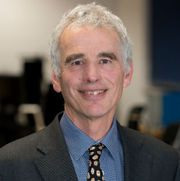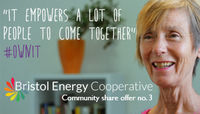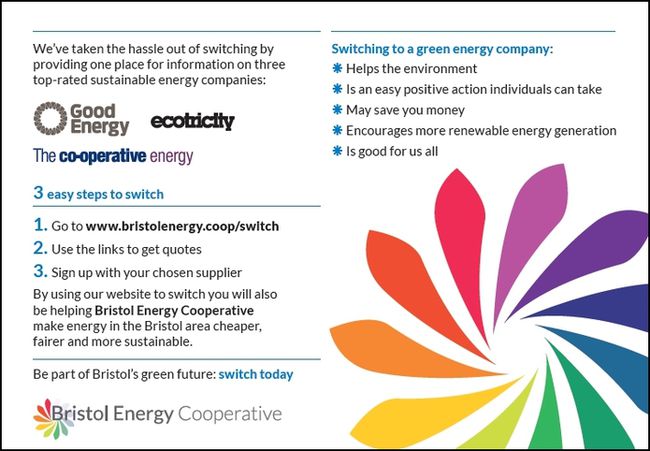17 May 2016
Bristol Energy Cooperative: "it felt right for us to be ambitious"
 You may have read recently about Bristol Energy Coop (BEC) and their ambitious share offer which aimed to raise £10.5 million for renewable energy projects in Bristol. They have already reached £9 million, and are still looking for the last bit, and it’s not limited to people from Bristol, so if you’d like to support them, see more info here. BEC was set up 5 years ago in order to accelerate the rollout of renewable energy in the city, and to use that to drive local economic regeneration and to recycle benefits locally. If that all sounds very Transition to you, as you’ll see later, it is. I asked Andy O’Brien and Chris Speller, BEC directors, to tell us more about what they do (here is the podcast, edited transcript below):
You may have read recently about Bristol Energy Coop (BEC) and their ambitious share offer which aimed to raise £10.5 million for renewable energy projects in Bristol. They have already reached £9 million, and are still looking for the last bit, and it’s not limited to people from Bristol, so if you’d like to support them, see more info here. BEC was set up 5 years ago in order to accelerate the rollout of renewable energy in the city, and to use that to drive local economic regeneration and to recycle benefits locally. If that all sounds very Transition to you, as you’ll see later, it is. I asked Andy O’Brien and Chris Speller, BEC directors, to tell us more about what they do (here is the podcast, edited transcript below):
Chris: When we fit solar on community buildings, the buildings get cheaper and greener electricity, local people can obviously invest in what we’re doing, and we’ve set up a community fund that will cross-subsidise other energy projects, and indeed, community projects more generally. By providing a platform with a low entry threshold financially (the shareholding minimum is £50) and in terms of time and effort (it is easy to invest on-line), we are enabling virtually anyone to participate in and benefit from the transition to renewable energy. People can also become more involved if they want through volunteering and we have a steady stream of post-graduates working with us because they believe in the cause and want to gain experience in community energy.
Andy: Our current share offer is for about £10.5 million and it’s for a portfolio of solar projects. Two of those are solar farms. One is an existing solar farm in Somerset and the other solar farm is under construction as we speak in Lawrence Weston in Bristol, near the Docks. Alongside these there’s a portfolio of installations on more community buildings, similar to what we did in our first two share offers. All together that’s about £10.5 million.
This is actually our third fundraise. The first was back in 2012 and raised about £125,000. That gave us the money to install on three community roofs. he second raised about the same amount. Then we were looking to do a larger one about 18 months, 2 years ago, but in the end the projects didn’t quite come off. But that would have been in between our first and second share offers and what we’re doing now. Now things have changed a little bit in the solar space, so it’s allowed us to jump up a little notch further. We can do slightly larger projects this time round.
When you say “things have changed in the solar space”, I imagine you mean the cuts to the Feed in Tariff (FiT) that happened last year and which hit a lot of community energy projects very hard. That model where you install solar PV and then you claim the tariff and you recycle that back into community projects, for many people seems to be considered finished at this stage, and a reason for scaling back. Yet you seem to have gone the other way in response to that. What’s the thinking there?
 Andy: We’ve managed to pre-accredit the schemes in this current fundraise, so that means that we lock in to the FiT rate that’s actually in place at the time you apply for that pre-accreditation. So we did that back in August last year. Because we’re a community organisation, that basically gives us a year to build these projects out at the FiT rate that was in place back last year. But if we don’t build them out in time, then the current FiT rate wouldn’t be viable really, wouldn’t make our projects viable.
Andy: We’ve managed to pre-accredit the schemes in this current fundraise, so that means that we lock in to the FiT rate that’s actually in place at the time you apply for that pre-accreditation. So we did that back in August last year. Because we’re a community organisation, that basically gives us a year to build these projects out at the FiT rate that was in place back last year. But if we don’t build them out in time, then the current FiT rate wouldn’t be viable really, wouldn’t make our projects viable.
Chris: Andy makes that sound quite considered, but in fact, the series of changes in government policy were really quite rapid last Autumn, and we had to move very quickly and were essentially being opportunistic in mopping up as many of the last FiTs on projects that we could potentially build out. So it was a slightly bigger step up than we would have planned for, but it was opportunistic, to try and make the most of this pre-accreditation.
And once this is all done, what does the future of community energy look like to you?
Andy: In the very short-term – the next 12 – 18 months – it may be a question of, say, acquiring other sites that are already built out that maybe a developer wants to sell. Because those projects would have the FiT that was in place when that was constructed, so that still makes it a decent project in terms of return. And there are quite a few developers who want to sell.
Some developers just work on that method anyway. They build out, sell, then use the profits to do the next development. And then there are other developers – quite a few foreign developers – who are leaving the market because they’re not seeing the government being that supportive towards renewables, so they’re selling off their portfolio. There are those sorts of opportunities.
There are other projects where you may get equity investors who particularly invest, say, for three years, and then recoup their profits and go to the next project. At a large scale, those sort of projects are around, but that’s not necessarily where we saw ourselves going only a few months ago, or a year ago. We’d prefer really to be doing new things, rather than necessarily taking up other projects.
£10.5 million is an enormous amount of money. How have you managed to do that? What’s been your approach?
 It’s a mixture of things really. Because we have been going since 2011, when we formally set up the co-op, that’s quite a long time. With the two previous share offers we’ve learnt quite a lot of the technical aspects of installing panels and raising the finance, and worked with lots of partners. What we’ve managed to do here really is extend those relationships. So with this current fundraise, about £2.5 million has come in from the public, from share offers and bond offers. The rest is coming in through loans, so for example Triodos Bank have loaned to us, and Close Brothers, Bristol City Council, and also Social and Sustainable Capital.
It’s a mixture of things really. Because we have been going since 2011, when we formally set up the co-op, that’s quite a long time. With the two previous share offers we’ve learnt quite a lot of the technical aspects of installing panels and raising the finance, and worked with lots of partners. What we’ve managed to do here really is extend those relationships. So with this current fundraise, about £2.5 million has come in from the public, from share offers and bond offers. The rest is coming in through loans, so for example Triodos Bank have loaned to us, and Close Brothers, Bristol City Council, and also Social and Sustainable Capital.
It helps that Triodos is based in Bristol, and the Council, you know, we’ve had a long relationship with them. Some of the first buildings that we installed the solar on, were on council buildings. So it’s meant that we’ve been able to develop those relationships, and extend them, and it’s helped us to scale up. It helps that last year Bristol was European Green Capital. It felt right for us to be ambitious and challenge the city really to help us reach those totals.
You mentioned before about Transition. Does the Bristol Energy Co-op have any overlap with Transition Bristol, or is there any sense in which the Transition world has influenced what you do and how you do it?
Andy: Very much so. I was inspired to set up the Co-op when I attended Transition Bristol’s ‘Big Event’ in December 2007 which actually you spoke at, Rob, along with people like Jeremy Leggett from Solar Century, and all sorts of people. It was a great event. I was quite new to this environment at that time.
It’s only sort of two years later I found the old programme. I looked at all these names of the speakers, I thought, “Crumbs, they got a good speaker list that day!” You know, some of the expertise, I think that’s just helped develop so many areas, whether it’s the Food Network, or whether it’s the Bristol Pound, or whether it’s the Bristol Energy Co-op, or Bristol Green Doors.
I can remember maybe for a year after that initial meeting, there were almost monthly, fairly Open Space meetings where people came along and chucked out ideas, and various things span out of that. In some ways it’s done what the Transition thing originally set out to do. You almost had that initial steering group who almost put themselves out of business. You bring the idea forward and then other people take up things and run with them, and they grow and it’s not sort of centrally controlled. I think that’s what’s happening in Bristol.
I’m not really that aware, funnily enough, right now, of what Transition Bristol are doing, because I think the various members – whatever membership means – they’re all involved in say, the community farm, or whatever. So it’s a lovely organic process where I think things are just growing.
What would your advice be to others wanting to emulate what you’re doing?
Andy: We’ve been very fortunate that just as we were getting to this crucial time of needing to meet various deadlines, we started working with Mongoose Energy. They’re a spin-off from Bath and West Community Energy, who in some ways are the most successful energy co-op in the country in the terms of the number of projects they’ve done, and the size and speed.
They’ve started to help other groups across the country to do similar projects, and they took that one stage further by actually setting up a proper stand-alone company that could help groups scale up. They provide the services that a local group might not have themselves. It’s like a turnkey service – they help find a project, finance it, project manage it. Whatever the local group doesn’t have, Mongoose can provide.
The way it works is there’s no financial risk to the community group. Any project management fees that you pass on to Mongoose, that’s only done at the end of the project when it’s all built out and all the risk has been taken care of. So it’s fantastic because it gives groups across the country, who’ve got enthusiasm and ideas, pretty much a complete support package.
You can go to them and say, “we’ve got an idea here, can you help us?”, and they provide as much or as little as is needed. That came at a critical time for us. They brought one of the projects to us and they helped us very much to develop one of the other projects.
Our current them is ‘Renewal’. Does this feel like a time of renewal to you?
Andy: For me, I’m just quite blown over really by the response post-Paris. Not of the UK government though! I get a daily update on this sort of stuff. The number of businesses that now are just saying, “we’re going for it” – almost independent of what the government is saying, they are making commitments now to get to zero carbon by a certain date.
 There are lots of different coalitions setting up, whether it’s around a particular sector, or around a particular interest group. It’s so cross-sector and it’s linking so many people up, that it’s all going to happen whether or not the government decides to help or not. That, for me, is fantastic.
There are lots of different coalitions setting up, whether it’s around a particular sector, or around a particular interest group. It’s so cross-sector and it’s linking so many people up, that it’s all going to happen whether or not the government decides to help or not. That, for me, is fantastic.
The beauty of it is that’s not just in Bristol, it’s across the board, across the world. It’s so nice to see the fact that this Paris Agreement, which has to go through various stages before it’s formally adopted, people were expecting it to be fully signed off in 2017 or 2018, but now it looks like it might actually be done by the end of this year. To see that sort of stuff happening, I just find fantastic.
Chris: And mainstream figures like Mark Carney (Governor of the Bank of England) being very clear on how they see the business and the financial future is helping fuel this too.
